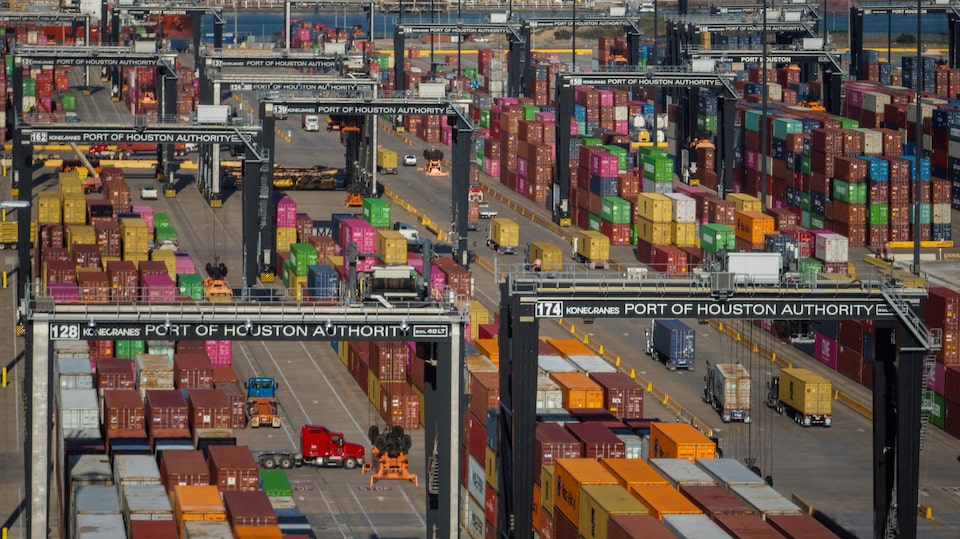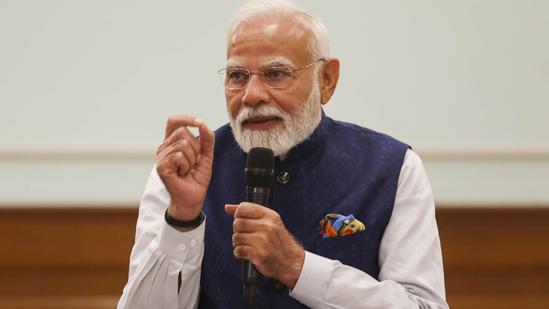A drone view shows trucks as they transport cargo at the Bayport Container Terminal in Seabrook, Texas, U.S., April 7, 2025. REUTERS

U.S. President Donald Trump signs an executive order at the White House in Washington, D.C., U.S., April 8, 2025. REUTERS
Summary
- Chinese goods slapped with 104% tariffs
- Duties target rivals and allies alike, risk recession
- Global market sell-off resumes, bonds tank
- Japan, South Korea, Vietnam prep for trade talks
- For a detailed graphic on tariffs:
BEIJING/WASHINGTON, April 9 (Reuters) – President Donald Trump’s “reciprocal” tariffs on dozens of countries took effect on Wednesday, including massive 104% duties on Chinese goods, deepening his global trade war even as he prepared for negotiations with some nations.
Trump’s punishing tariffs have shaken a global trading order that has persisted for decades, raised fears of recession and sent stock markets around the world reeling.
The S&P 500 (.SPX), has shed nearly $6 trillion since Trump unveiled the tariffs a week ago, the deepest four-day loss since the benchmark’s creation in the 1950s. The index is now nearing a bear market, defined as 20% below its most recent high.
A sell-off across most Asian markets resumed on Wednesday with Japan’s Nikkei (.N225), down 3%, South Korea’s currency hitting a 16-year low, and government bonds suffering heavy losses as investors dashed for the safety of cash.
European and U.S. stock futures pointed to more pain ahead. Chinese stocks held firm, however, as state support propped up the ailing market.
Trump has offered investors mixed signals about whether the tariffs will remain in the long term, describing them as “permanent” but also boasting that they are pressuring other leaders to ask for negotiations.
“We have a lot of countries coming in that want to make deals,” he said at a White House event on Tuesday afternoon. He said at a later event that he expected China to pursue an agreement as well.
Trump’s administration has scheduled talks with South Korea and Japan, two close allies and major trading partners, and Italian Prime Minister Giorgia Meloni is due to visit next week.
The deputy prime minister of Vietnam, the low-cost Asian manufacturing hub hit with some of the highest duties globally, is set to talk with Trump’s Treasury Secretary Scott Bessent later on Wednesday.
The prospect of deals with other countries had pushed stock markets up earlier on Tuesday, but U.S. stocks had ceded their gains by the end of the trading day.

CHINA VOWS TO FIGHT
Trump nearly doubled duties on Chinese imports, which had been set at 54% last week, in response to counter-tariffs that Beijing announced last week. China has vowed to fight what it views as blackmail.
Top Chinese brokerages pledged to join efforts by Chinese state holding companies to help steady domestic share prices in response to the tariff-induced turmoil.
The video player is currently playing an ad. You can skip the ad in 5 sec with a mouse or keyboard
Central banks in New Zealand and India cut rates on Wednesday in what could presage a broader move by policymakers to try and cushion the tariff hit to their economies.
Other nations are funneling fiscal support to key export sectors with South Korea announcing a raft of emergency measures for automakers, including tax cuts and subsidies.
Some economists have warned that U.S. consumers will ultimately bear the brunt of the trade war, facing higher prices on everything from sneakers to wine.
Nearly three-quarters of Americans expect the prices of everyday items to rise in the next six months, a new Reuters/Ipsos poll found.
The full effects of Wednesday’s tariffs may not be felt for some time, as any goods already in transit as of midnight will be exempt from the new levies as long as they arrive in the U.S. by May 27.
Trump’s earlier across-the-board 10% tariffs on all imports from many countries began on Saturday.
The latest round of duties, which took effect at 12:01 a.m. According to Trump, ET (0401 GMT), is aimed at countries that are “ripping off” the U.S..
That list includes many of the United States’ closest allies, including the European Union, which was hit with a 20% tariff as well as industry-specific duties. The 27-member bloc will vote on initial counter-measures later on Wednesday.
Trump has said the tariffs are a response to barriers put on U.S. goods and are needed to fix America’s trade imbalances. He has also accused countries including Japan of devaluing their currencies to gain a trade advantage, something Tokyo denies.
Japan’s finance minister on Wednesday said trade negotiations with Washington could include foreign exchange rates.
Trump has signaled he may not be finished on tariffs.
In remarks to Republican lawmakers on Tuesday evening, he said he would soon announce “major” tariffs on pharmaceutical imports, one of a handful of categories of goods that have been exempted from the new taxes.

Reporting by Reuters newsrooms; Writing by Joseph Ax and John Geddie; Editing by Lincoln Feast.





